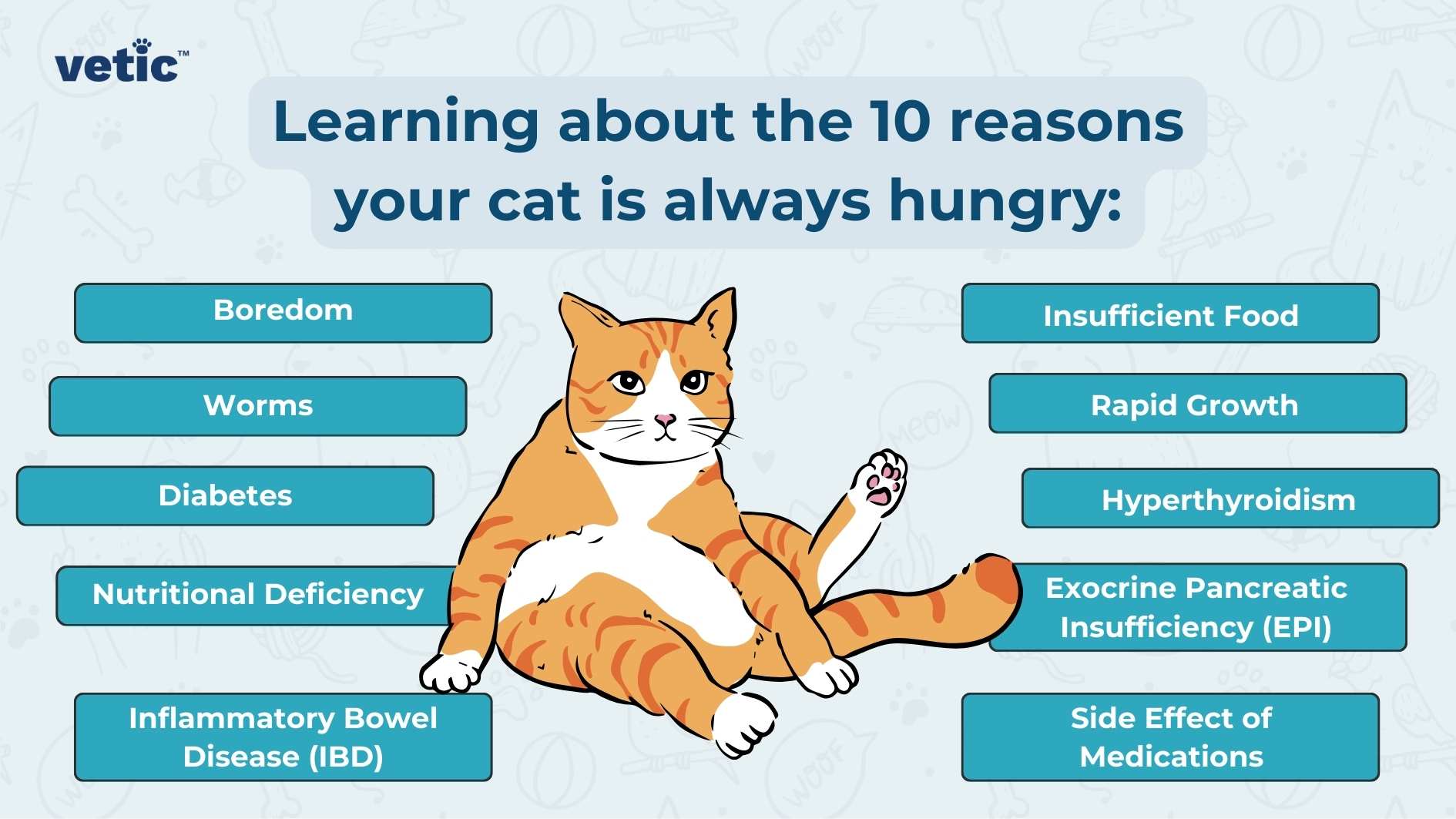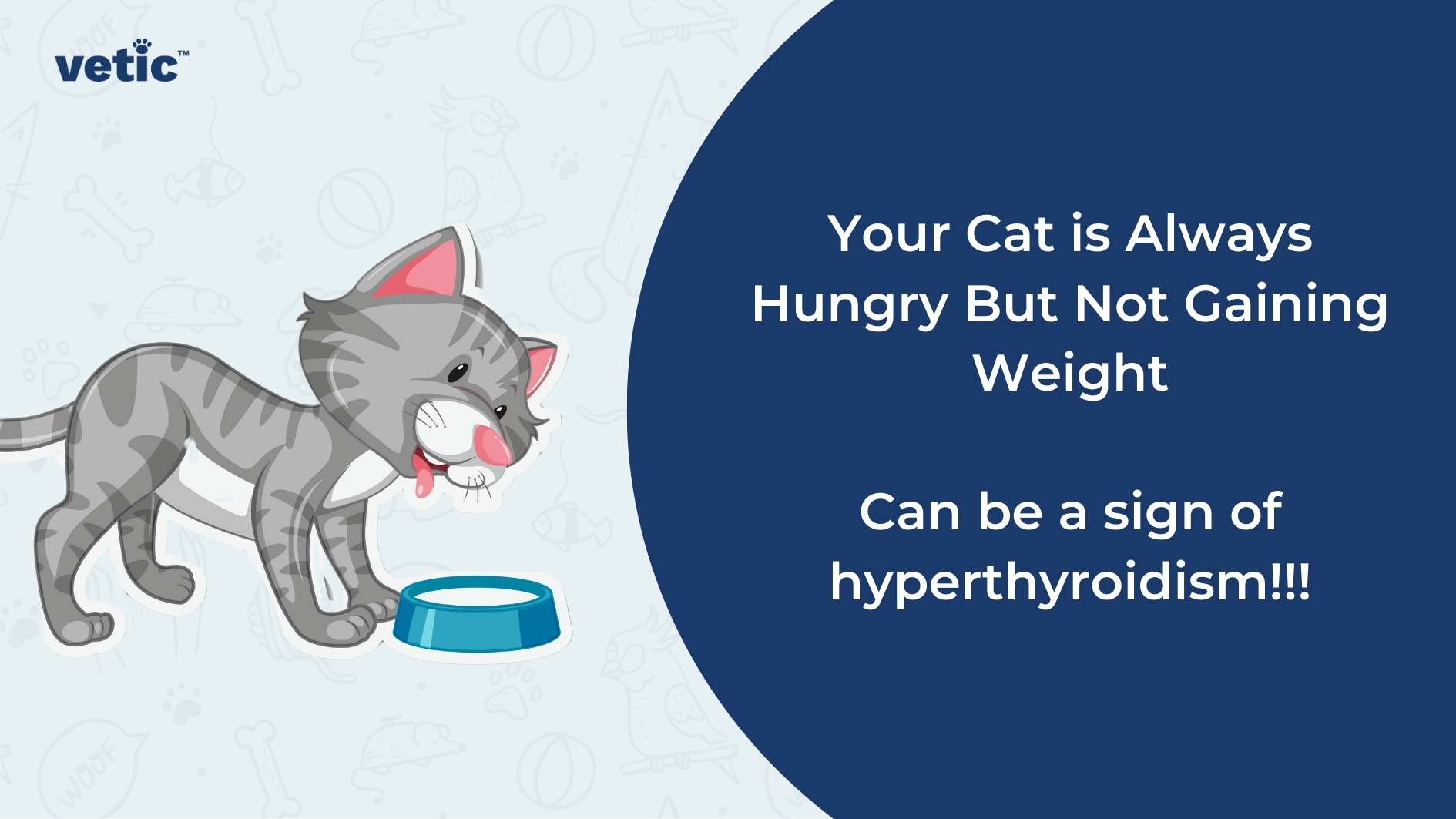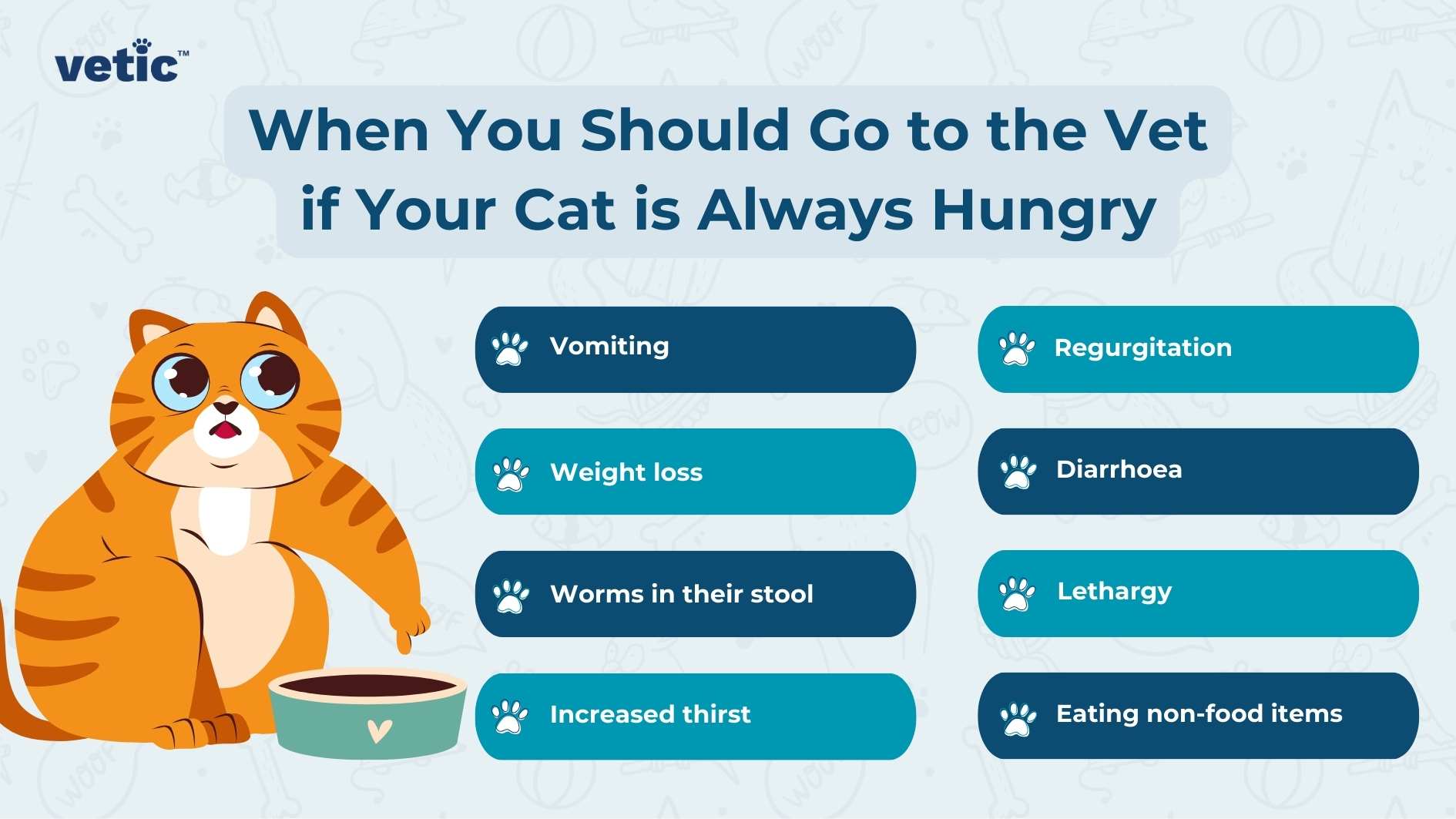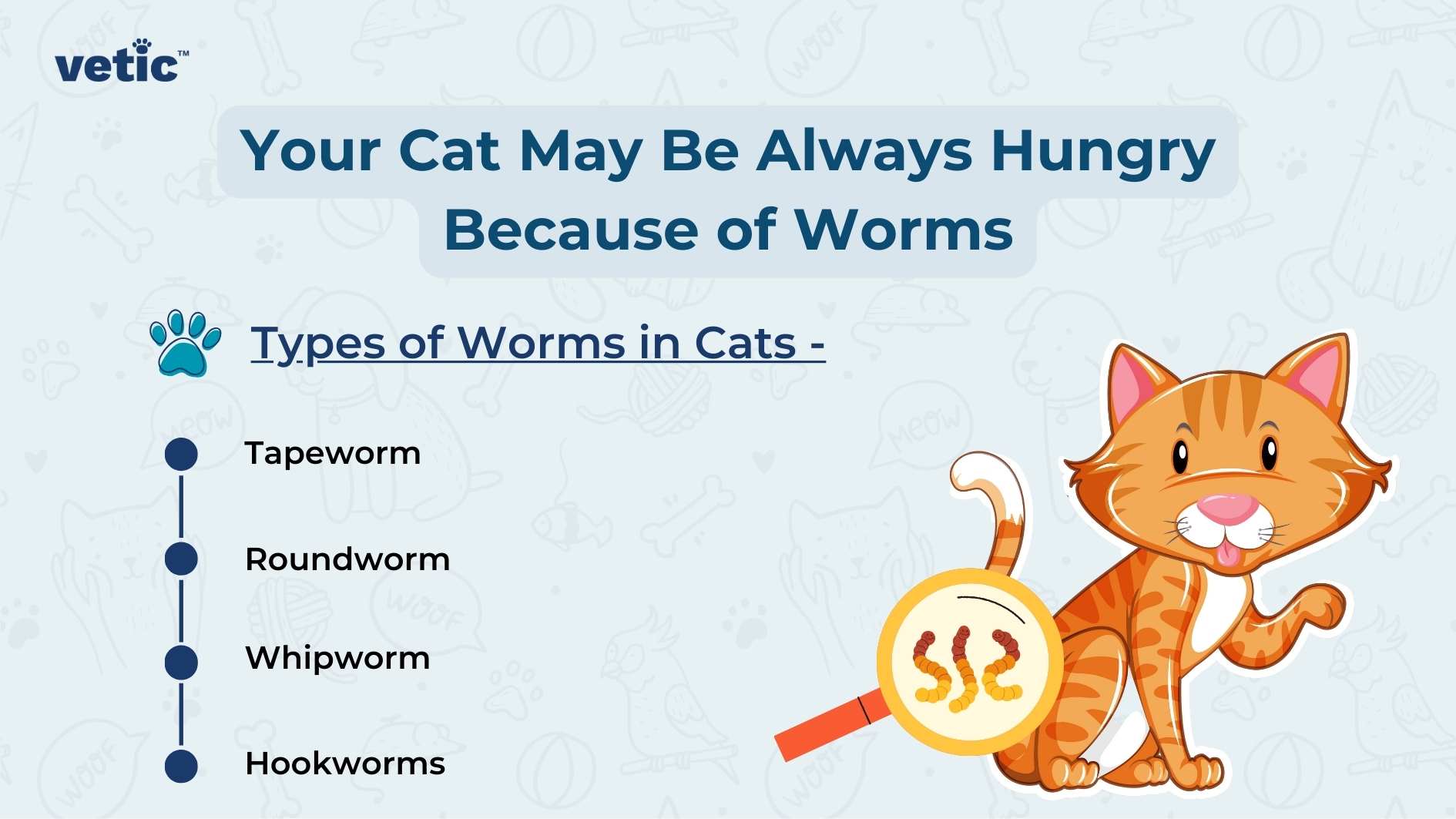Cats normally eat small amounts of food throughout the day. However, some cats are never satisfied with the quantity of food you give them, they polish off their share and then they demand more. If your cat is always hungry, it can signify a problem. The condition is called polyphagia and it should be checked out by a veterinarian.
10 reasons your cat is always hungry
- Boredom
- Insufficient Food
- Worms
- Rapid Growth
- Diabetes
- Hyperthyroidism
- Nutritional Deficiency
- Exocrine Pancreatic Insufficiency (EPI)
- Inflammatory Bowel Disease (IBD)
- Side Effect of Medications
Learning about the 10 reasons your cat is always hungry:

1. Boredom
Cats, like humans, can eat out of boredom. When a cat has little to engage with, they might turn to food as a form of entertainment or comfort. This behaviour is more common in indoor cats who lack stimulation from their environment.
A cat that eats out of boredom might be constantly begging for food or searching for snacks, even after a full meal. To address this, ensure your cat has plenty of toys, scratching posts, and interactive activities to keep them mentally and physically stimulated.
2. Insufficient Food
Sometimes, your cat’s constant hunger is simply because they aren’t getting enough food. Cats have specific dietary needs, and if their meals are too small or lack essential nutrients, they may feel hungry all the time.
Ensure that your cat’s diet includes the right balance of proteins, fats, and carbohydrates. It’s also important to feed them high-quality cat food designed to meet their nutritional requirements.
3. Worms
Parasites like worms can be a significant cause of increased hunger in cats. Intestinal worms, particularly tapeworms, feed off the nutrients in your cat’s diet, leaving them malnourished and hungry, no matter how much they eat.
If your cat has a voracious appetite along with symptoms like weight loss, vomiting, or a dull coat, it could be a sign of a parasitic infection. Regular deworming treatments and vet check-ups are essential to keep your cat healthy and free from parasites.
4. Rapid Growth
Kittens and young cats are in a phase of rapid growth, which requires more energy and nutrients. During this time, it’s normal for them to be hungrier as their bodies are developing.
However, even in adult cats, growth spurts or increased activity levels can lead to a temporary increase in hunger. It’s crucial to provide the right amount and quality of food to support their growth without overfeeding, which can lead to obesity.
5. Diabetes
Diabetes mellitus is a condition that affects the body’s ability to produce or respond to insulin, leading to high blood sugar levels. In cats, diabetes mellitus can cause increased hunger because their bodies can’t properly use the glucose from their food, leading them to eat more in an attempt to gain energy.
If your cat is always hungry, drinks more water than usual, and is losing weight despite eating more, it’s essential to consult a veterinarian for testing and appropriate management.
6. Hyperthyroidism

Hyperthyroidism is a common condition in older cats where the thyroid gland produces too much thyroid hormone. This hormone controls metabolism, and when in excess, it can cause rapid weight loss, increased thirst, and constant hunger.
If your cat has become ravenous but continues to lose weight, hyperthyroidism might be the cause. Treatment typically involves medication, dietary changes, or in some cases, surgery or radioactive iodine therapy.
7. Nutritional Deficiency
If your cat’s diet is lacking in essential nutrients, they may feel hungry even after eating. Nutritional deficiencies can arise from feeding low-quality food or an unbalanced diet that doesn’t meet their specific needs.
For instance, a lack of certain amino acids or vitamins might trigger persistent hunger as your cat tries to compensate. Ensuring that your cat’s food is complete and balanced, with the right mix of nutrients, is key to preventing this issue.
8. Exocrine Pancreatic Insufficiency (EPI)
EPI is a condition where the pancreas doesn’t produce enough enzymes to properly digest food. This leads to malabsorption, meaning your cat can eat a lot but still feel hungry because their body isn’t getting the nutrients it needs.
Symptoms of EPI in cats include weight loss, increased appetite, and greasy stools. If you suspect EPI, a vet can diagnose the condition with tests and recommend enzyme supplements to help your cat properly digest their food.
9. Inflammatory Bowel Disease (IBD)
Inflammatory Bowel Disease is a chronic condition that causes inflammation in the gastrointestinal tract, leading to symptoms like vomiting, diarrhoea, and weight loss. Cats with IBD often feel hungry because their bodies aren’t absorbing nutrients properly.
The inflammation interferes with digestion, making it difficult for them to get the energy they need from their food. Managing IBD typically involves dietary changes, medications, and regular vet care to control symptoms and improve nutrient absorption.
10. Side Effect of Medications
Certain medications, such as steroids, can increase your cat’s appetite as a side effect. Steroids are often prescribed for conditions like allergies or inflammation, but they can make your cat feel hungrier than usual. Other medications, like anticonvulsants or treatments for chronic conditions, may also stimulate appetite. If your cat’s hunger suddenly increases after starting a new medication, consult your veterinarian. They may adjust the dosage or suggest alternative treatments.
Should You Go to the Vet if Your Cat is Always Hungry?

If your cat is always hungry and you have been noticing this for the past 1 week or so, you need to keep an eye on them for other signs. These other signs can include –
- Vomiting
- Regurgitation
- Weight loss
- Diarrhoea
- Worms in their stool
- Lethargy
- Increased thirst
- Eating non-food items
How Will the Veterinarian Determine Why Your Cat is Always Hungry?
The veterinarian will begin with a thorough physical examination along with scanning their medical history. You need to tell them when your cat was last dewormed and when they were spayed.
Since our little furbabies can’t speak, they often require blood and biochemistry tests for determining the cause of any disease.
The veterinarian will run blood tests the check their –
- Complete blood count (CBC)
- Liver function (LFT)
- Kidney function (KFT)
- Pancreatic health
- Thyroid
They might recommend a stool test as well to determine if your cat has internal parasites and of which type. Roundworms and tapeworms can make your cat hungry all the time, but without significant weight gain.
If there’s cause for concern, your veterinarian will also recommend an abdominal X-ray and ultrasound to check the health of the gastrointestinal system.
How to Reduce Your Cat’s Appetite?
The ways to reduce your cat’s appetite if they are hungry all the time depends on the reason for their sudden increase in appetite.
If it is a heavy worm load, your veterinarian will recommend the right dose of dewormers for your cat.

If it’s hyperthyroidism or any other metabolic disorder, they will receive medication along with prescription food which will boost satiety.
In case they are hungry all the time because they are bored you will have to spend more quality time with your pet.
Steer clear of cheap dry cat food and invest in grain-free or veterinarian recommended cat food to keep your cat’s nutritional needs and hunger satisfied. This will also address the needs of cats (kittens) with sudden growth spurts.
Since, there can be at least 10 reasons why your cat is always hungry, you must visit the vet to find out the root cause. Formulate a feeding plan with your veterinarian that suits your cat’s age, nutritional needs and weight.
All in all, to manage the increased hunger, you can feed smaller, more frequent meals or offer low-calorie treats to satisfy your cat without risking weight gain. It’s important to monitor your cat’s weight and overall health while they are on medications that can affect their appetite to ensure they remain healthy.

